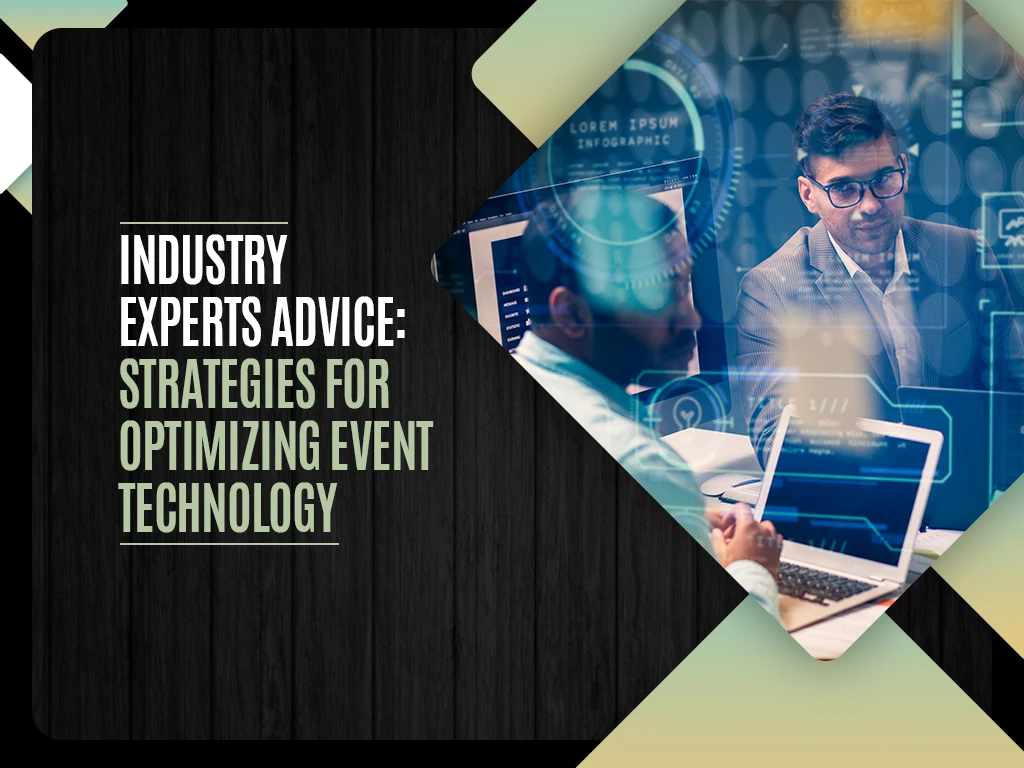Industry Experts Advice: Strategies for Optimizing Event Technology

In the fast-paced age we live in today, event technology has transformed how we plan, organize, and execute events. From registration platforms to virtual event tools, there are myriad ways to enhance attendee experiences and achieve success. To discover tips from industry leaders on maximizing event tech, we’ve consulted experts who excel at leveraging technology to deliver events. In this post, we’ll share their insights and advice to help you get the most out of your event technology investments.
1. Selecting the Right Event Tech Solution:
One common piece of guidance from industry professionals specializing in an event management technology guide emphasizes the importance of choosing the event tech solution for your requirements. With a range of options on the market, it can be daunting to make an informed decision. However, by evaluating your goals and taking into account aspects like scalability, integration capabilities, data security, and ease of use, you can make a choice that aligns with your needs.
2. Knowing Your Audience:
Another crucial aspect of maximizing event technology is having an understanding of your audience. By gaining insights into their preferences and expectations through surveys or feedback mechanisms, you can customize your solutions accordingly. Whether you’re talking about apps or incorporating elements of gamification into a virtual setting, understanding what captivates your audience is key to crafting memorable experiences that go above and beyond their expectations.
3. Prepare for Smooth Integration:
When integrating event technology into your plan, it’s essential to ensure a connection with existing systems like CRMs or marketing automation platforms. Experts in the field highlight the importance of technologies that can communicate seamlessly with each other to prevent data silos and manual workarounds. This integration streamlines operations across departments, fostering coordination and effective resource utilization.
4. Utilize Data Analysis:
Gone are the times when events focused on networking and branding; nowadays, events generate a wealth of data that offers insights for future event organizations. By utilizing event technology solutions with robust analytics features, you can access information on attendee behavior, metrics, session popularity, and more. These insights enable you to adjust your approach in time and make informed decisions based on data to enhance the attendee experience.
5. Embrace Virtual Events and Hybrid Models:
The industry has seen a shift towards hybrid events driven by the pandemic. Leaders in the field emphasize embracing these formats by harnessing technology to provide immersive experiences for both virtual attendees and those present in person. Using streaming, interactive Q&A sessions, networking lounges, and virtual exhibitor booths can help engage participants effectively while maintaining authenticity for those present in person.
6. Guide Attendees on User Friendly Platforms:
Navigating complex event tech platforms might be daunting for attendees as they might find it difficult to access tools. Offering instructions, training videos, or guides can help users adapt while reducing support inquiries during the event. Consider creating resources explaining features like chat options, polls, or virtual breakout rooms to ensure attendees fully utilize the technology.
7. Involve Staff and Volunteers:
Involving staff and volunteers in event tech training is crucial for providing support during the event. As frontline representatives of your organization, they should be proficient in addressing issues within the technology platform used, including registration processes and specific challenges faced by their colleagues or attendees.
8. Emphasize Cybersecurity:
With advancements come increased risks of cybersecurity breaches and data breaches. Prioritizing cybersecurity when implementing event tech solutions is vital. Collaborate with vendors offering hosting environments with encryption protocols while adhering to privacy regulations such as GDPR or CCPA.
9. Consistently Gathering Feedback:
Lastly, experts in the field suggest seeking input from stakeholders on a regular basis, such as speakers, sponsors, exhibitors, and attendees. This helps pinpoint areas for improvement and address any issues that may arise. Collecting feedback on user experiences, desired features, or technical issues allows you to refine your event technology strategy and ensure enhancements.
Conclusion
In conclusion, optimizing event technology is crucial for creating impactful and efficient events. Industry experts highlight the need for careful tech selection, understanding your audience, seamless integration, data analysis, embracing hybrid models, guiding users, training staff, prioritizing cybersecurity, and gathering feedback. By embracing these strategies, organizers can surpass attendees’ expectations and enhance event operations. Staying informed and adaptable in the evolving event tech landscape is key to success, ensuring memorable experiences for all involved.

